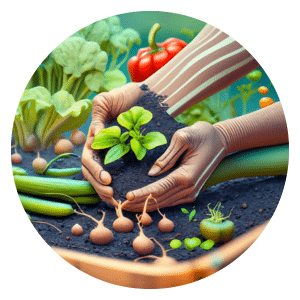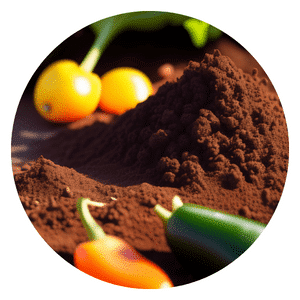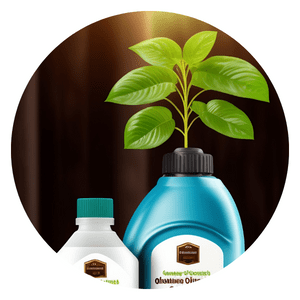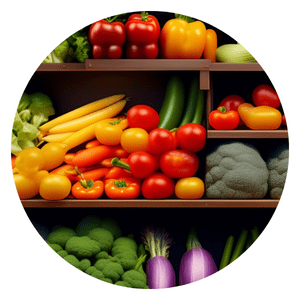What Fertilizer Is Best For Root Vegetables?
Are you tired of pulling up sad, stunted carrots from your garden? Do you dream of plump, vibrant root vegetables that make your mouth water?
Well, the secret to achieving root vegetable greatness lies in one key ingredient: fertilizer.
But with so many options on the market, how do you know which one is best for your beloved carrots and beets?
In this article, we will explore the different types of fertilizers available and delve into the science behind their effectiveness. Get ready to take your root vegetable game to a whole new level!

Root Vegetables Fertilizer
Compost
Compost is a fantastic source of this nutrient. The slow, steady release of nitrogen from compost provides an ideal growing environment for root crops.
As the compost breaks down, beneficial bacteria convert organic matter into plant-available forms of nutrients, ensuring that your root vegetables receive a consistent supply throughout their growth cycle. This continual nourishment promotes robust and healthy root development, leading to larger yields and better flavor.
In addition to providing a rich source of nitrogen, compost also enhances the soil structure for root vegetable crops.
The organic matter in compost helps to improve soil drainage while retaining moisture at the same time. This balanced water retention is crucial for successful growth of roots like carrots or beets, preventing them from becoming overly saturated or drying out completely.
Furthermore, incorporating high-quality compost into the soil improves its overall texture by breaking up heavy clay soils or adding structure to sandy ones. This supports healthy root growth by allowing roots to penetrate easily through the soil and access vital nutrients.
To give your root crops an extra boost throughout their growing season, top-dress your plants with a layer of well-aged compost as they mature. Not only does this provide additional nutrition but also acts as a natural mulch that insulates plant roots from extreme temperatures and reduces weed competition.
By regularly adding quality compost to your garden beds before planting and during the growing season, you’ll create an ideal environment that ensures thriving root vegetable plants with maximum yields and exceptional flavor on your plate
Manure
When it comes to fertilizing root vegetables, nothing beats the natural goodness of manure.
But not just any manure will do; it’s crucial to use rotted or composted manure. Why? Because this ensures that all harmful bacteria and pathogens have broken down, making the manure safe for your plants and the environment.
Cow, horse, chicken, or rabbit manures are all excellent options for root crops. Each type has its own unique benefits.
Cow and horse manure provides a good balance of nitrogen, phosphorus, and potassium while adding essential organic matter to the soil.
Chicken manure is high in nitrogen, making it ideal for leafy greens like spinach or lettuce.
Rabbit manure is rich in phosphorus and helps strengthen roots while providing a gradual release of nutrients.
To make sure your veggie garden thrives, incorporate the rotted or composted manure into the soil before planting. This allows roots easy access to essential nutrients as they grow and develop underground.
Remember to avoid applying fresh manure directly on the plant as it can burn their delicate roots due to its high concentration of ammonia.
Fish emulsion
Fish emulsion is a highly effective and environmentally friendly fertilizer for root vegetables. Its fast-acting nitrogen content helps promote vigorous growth and healthy development of roots.
What sets fish emulsions apart from other fertilizers is their ability to provide readily available nutrients in liquid form, making them ideal as supplemental feed during the growing season.
One key advantage of using fish emulsion is its natural composition. Derived from the remains of fish after processing, this organic fertilizer contains essential nutrients such as nitrogen, phosphorus, and potassium that are vital for root vegetable growth.
Unlike synthetic fertilizers, fish emulsions release these nutrients slowly over time, ensuring a steady supply without overwhelming the plants.
Moreover, the organic matter in fish emulsions also improves soil structure by enhancing moisture retention and promoting earthworm activity – two factors crucial for root vegetable cultivation.
Another reason why fish emulsion stands out is its ease of use.
The liquid form makes it convenient to apply directly to the garden bed or containers without much hassle. The nutrients can be quickly absorbed by the plants’ roots, leading to rapid growth and improved nutrient uptake efficiency.
Additionally, since fish emulsions are safe for both humans and pets when used as directed, there are no concerns about toxicity or harmful effects on the environment.
In the realm of earth and seed, we inquire, What fertilizer can root vegetables inspire? To nourish their thirst and their growth empower, A balance of nature's gifts must we scour. For carrots deep, a humus-rich domain, Compost mild enriches the underground train. Potatoes crave phosphorus, tubers rise bolder, Bone meal whispers secrets to their untold. Beets unfold sweetly with a touch of potash, Fertilizers organic paint colors they splash. Roots delve in soil's embrace, they seek divine touch, With nature as guide, these beauties flourish much.
Chappy The Gardener
Phosphorus fertilizers
When it comes to growing root vegetables, phosphorus fertilizer is essential for promoting optimal root development.
Root crops such as carrots, radishes, and potatoes rely heavily on phosphorus to establish a strong root system.
While there are different options available, bone meal and rock phosphate are natural fertilizers rich in phosphorus content.
Bone meal is derived from slaughterhouse waste and provides a slow-release form of phosphorus to plants. It not only enhances root growth but also improves the overall health of the soil by adding organic matter.
On the other hand, rock phosphate is an excellent natural choice containing high levels of phosphorous that can be slowly released over time.
For those seeking a faster-acting synthetic option, monocalcium phosphate can be a suitable choice. This synthetic fertilizer provides an immediate boost of available phosphorus, rapidly stimulating root growth.
However, it’s important to note that synthetic fertilizers should be used sparingly and with caution due to their potential environmental impact.
Potassium fertilizers
Potash, derived from potassium, plays a crucial role in the development of root vegetables. This essential nutrient promotes root growth by aiding in cell division and elongation.
Additionally, potassium assists in the movement of nutrients throughout the plant, ensuring that vital elements are distributed evenly to support healthy root development.
Aside from traditional synthetic sources like muriate of potash, there are several organic alternatives to consider. Wood ash, for example, is an organic source rich in potassium and other trace elements. Its alkaline nature can also neutralize acidic soils, creating a more favorable environment for root vegetable growth.
Another organic option is kelp meal. Derived from dried seaweed, it offers a balanced blend of major and minor nutrients essential for robust root development. Kelp meal not only provides potassium but also contains beneficial compounds like cytokinins and auxins that stimulate root growth.
Lastly, greensand is another organic source used as a slow-release fertilizer. It contains high levels of potassium along with valuable minerals such as iron and manganese. These additional nutrients play vital roles in various metabolic processes within plants, contributing to improved overall plant health and strong roots.
While synthetic fertilizers like muriate of potash may be commonly used due to their affordability and accessibility, it’s important to explore organic alternatives for sustainable gardening practices that promote healthier soil ecosystems overall.
Incorporating potassium-rich fertilizers like wood ash or kelp meal into your gardening routine can provide significant benefits beyond just promoting root growth.
Balanced fertilizers
When it comes to root vegetables, finding the right fertilizer is crucial for their healthy growth.
One option that stands out is using a natural or organic vegetable fertilizer blend with an equal or higher phosphorus to nitrogen ratio.
Phosphorus plays a critical role in root development and overall plant health, making it essential for root vegetables like carrots, radishes, and potatoes.
By opting for a balanced fertilizer with this ratio, you can ensure that your root crops receive the necessary nutrients they need to thrive.
Furthermore, slow-release fertilizers are particularly well-suited for promoting the growth of root vegetables. These types of fertilizers provide a steady supply of nutrients over an extended period of time, giving your plants a continuous source of nourishment as they develop underground.
The slow release method helps prevent nutrient runoff and leaching, ensuring that your crops efficiently utilize the fertilizer.
Not only does this promote stronger roots and healthier plants, but it also minimizes the risk of nutrient deficiencies or excesses that can hamper crop productivity.
Worm castings
Root vegetables thrive on nutrient-rich soil, and one of the best natural fertilizers to achieve this is worm castings. Also known as vermicompost, these are the valuable byproduct of the digestion process that worms undergo.
Worm castings are a goldmine of nutrients for plants, containing essential elements such as nitrogen, phosphorus, and potassium.
Additionally, they are packed with micronutrients that contribute to healthy root development and enhance overall plant growth.
What sets worm castings apart from other fertilizers is their ability to improve soil structure. The small granules create air pockets within the soil, allowing roots to penetrate more easily and absorb water efficiently. This promotes stronger root systems in root vegetables like carrots and beets, leading to bountiful harvests come harvest time.
Using worm tea derived from these castings can also provide an organic liquid feed for your plants.
By steeping a quantity of vermicompost in water for 24-48 hours and straining it out afterwards, you can obtain a potent liquid fertilizer ready for use directly or diluted.
Just like the solid form of worm castings when mixed into soil, the worm tea provides a nutrient-rich boost that promotes robust growth in root crops.
Kelp meal
One of the most sustainable and beneficial fertilizers for root vegetables is kelp meal.
Made from dried kelp, this natural product is rich in minerals and growth promoters that can greatly enhance root development.
Whether used as a soil amendment or a foliar spray, kelp meal provides essential nutrients such as potassium, iodine, zinc, and magnesium. These elements are crucial for healthy plant growth and can lead to more robust root systems.
Unlike synthetic fertilizers, which often contain harmful chemicals and contribute to environmental degradation, kelp meal offers an environmentally friendly alternative.
Harvested from oceanic sources that naturally replenish themselves, using kelp as a fertilizer helps reduce the demand for unsustainable practices such as mining for mineral-based fertilizers.
Additionally, the high concentration of nutrients in kelp makes it an efficient choice – only small amounts are needed to achieve noticeable results.
Another benefit of using kelp meal for root vegetables is its ability to stimulate microbial activity in the soil.
The carbohydrates present in kelp act as food for beneficial microorganisms like bacteria and fungi that aid in nutrient cycling and improve overall soil health. These microorganisms form symbiotic relationships with plants’ roots, facilitating nutrient absorption and enhancing their resistance to diseases.
To harness the full potential of kelp meal as a fertilizer for root vegetables, it can be applied directly to the soil or mixed with compost before planting.
It can also be brewed into a liquid solution and sprayed onto plant leaves for efficient absorption through foliar uptake.
Greensand
One often overlooked but highly beneficial fertilizer for root vegetables is greensand. This soft rock, composed of glauconite, contains a wealth of essential nutrients such as potassium, iron, and magnesium.
Additionally, it provides several trace elements that are vital for the healthy growth of root crops.
What makes greensand particularly valuable as a long-lasting supplement is its slow-release properties.
Unlike synthetic fertilizers that quickly dissolve in water and release their nutrients all at once, greensand gradually breaks down over time, providing a continuous source of nourishment for your plants. This ensures consistent and sustainable growth throughout the entire growing season.
Moreover, the addition of glauconite-rich greensand to your soil can have additional benefits beyond simply supplying nutrients to your root vegetables. It also improves soil structure and moisture retention capabilities.
The fine particles of greensand help loosen compacted soils and enhance drainage while simultaneously holding onto moisture necessary for plant roots to access when needed.
In conclusion, choosing the right fertilizer for root vegetables is crucial for their growth and development.
Organic fertilizers such as compost and manure provide essential nutrients without the risk of chemical buildup in the soil.
However, synthetic fertilizers can also be effective if used appropriately and in moderation.
It is important to consider factors such as soil quality, nutrient requirements, and environmental impact when selecting a fertilizer for root vegetables.
Experimenting with different types of fertilizers and observing the results can help determine which one works best for your specific set of vegetables.
Remember, healthy roots lead to bountiful harvests, so invest time and effort into finding the best fertilizer for your root vegetable garden.
Click To Grow
Helps Us Grow – Share If You Like















